Published Apr 20, 2021
How Should We View 24th Century Law Enforcement?
As we consider the social and political upheaval of 2020 in America, we're looking back at Odo's work on DS9.
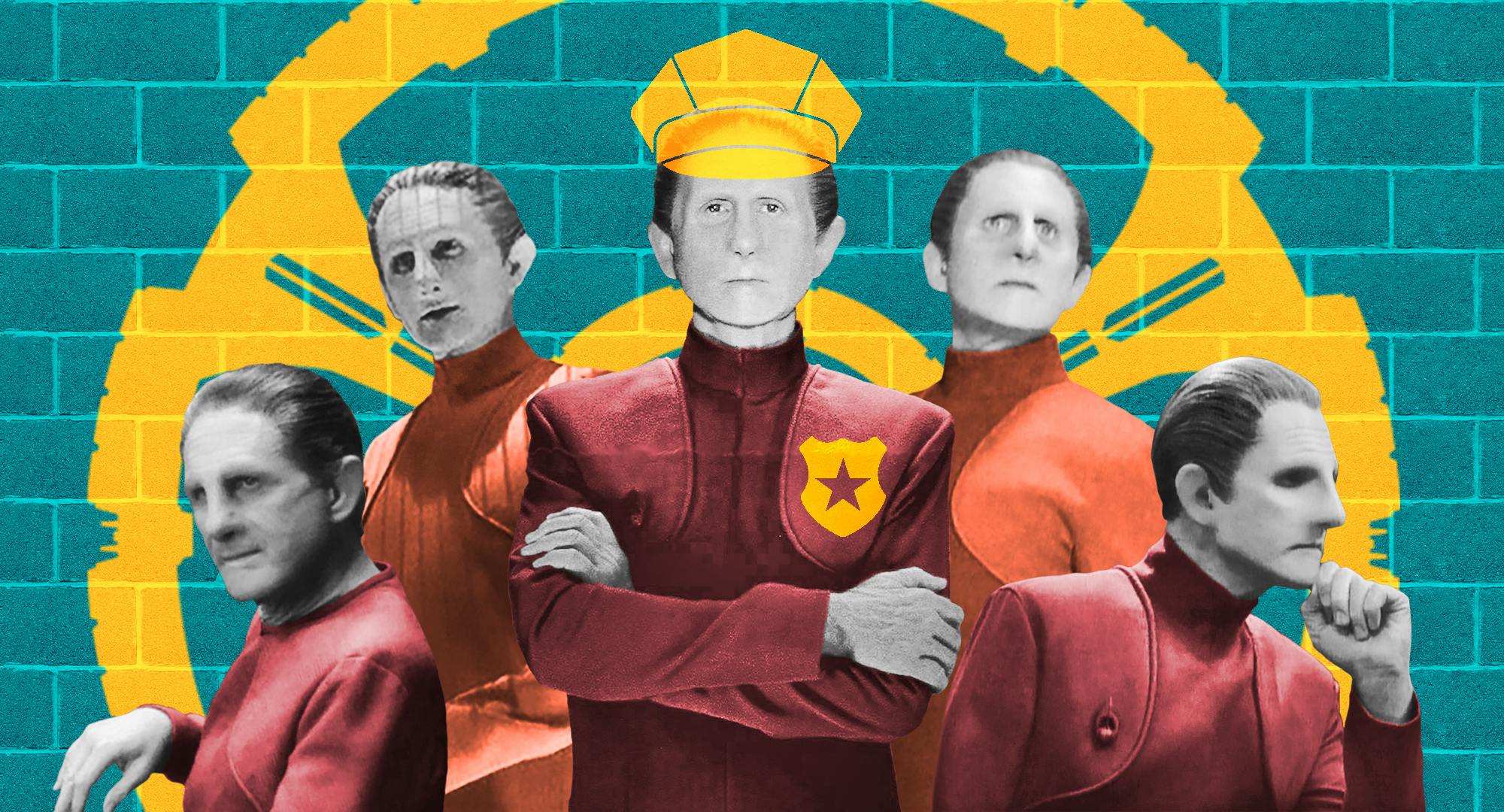
StarTrek.com
“All Cops Are Bastards.”
That intentionally-provocative phrase, which some sources credit to 1970s America, while others trace it back to the 1920s, criticizes the institution of policing as a whole and the role they play in our society. After the June 2020 murder of George Floyd in Minneapolis, Minnesota, the phrase gained popularity once again and it’s become common to see the abbreviated version, A.C.A.B., in use at protests, on social media, and more. Those who say it in earnest are saying that the system is corrupt, and that those who help uphold it — even the kind or well-intentioned ones — are just as corrupt themselves. They are, in some ways, even worse, the logic goes, because their kind demeanors and good intentions help provide public-relations cover for the other cops, the ones eventually caught committing horrifying acts of racism and brutality.
While that conversation is ongoing and nowhere near settled, the scope of the conversation has also expanded to ask: what about the cops presented in the art we enjoy? Can fictional characters, like the ones found on shows like Brooklyn 99 or the many Law and Orders uphold an oppressive system through cop propaganda, or “copaganda?”
To put it more simply: does “All Cops Are Bastards” include Constable Odo, the doughy-faced, moral absolutist in charge of security aboard Deep Space NIne’s Promenade?
Well? Short answer “yes,” long answer “no.” Let’s explore:
Is Odo Even A Cop?
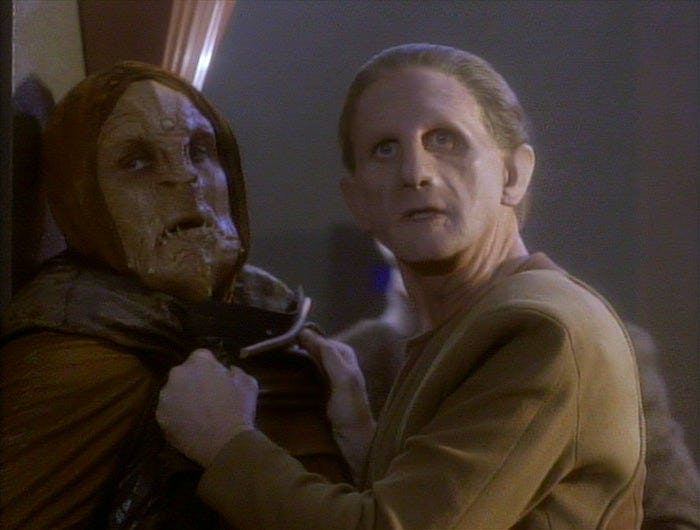
StarTrek.com
"Nobody ever had to teach me the justice trick. That's something I've always known. A racial memory from my species, I guess. It's really the only clue I have to what kind of people they are.” - Odo
This question seems simple on the surface, but it’s one worth digging in on. Fictional characters, by definition, do not live in our world, and organizations that seem similar to the police from our perspective may not have the same function in their fictional societies. Things like comics’ Green Lantern Corps, Harry Potter’s Aurors, or Kirk’s many doomed Red Shirts all show up to perform similar functions in the story as a cop would in a contemporary work — often arriving right at the end to either apprehend the bad guy or to shoot them — it doesn’t necessarily follow that these organizations have a legacy of abuse or of enforcing injustice upon unwilling citizens.
Star Trek: Deep Space Nine "Emissary, Part I"
That said, Odo is absolutely a cop, and one in a particularly old-school mold. Deep Space Nine evokes a Wild West frontier town, and all that comes with it. You’ve got a classic saloon (Quark’s), a single-room school run by a “school marm” who gets the job because she’s educated even though she has no educational training (Keiko O’Brien), a heavily-trafficked brothel (um, the holosuites) and, of course, the Sheriff. Though at first glance the Promenade may resemble a shopping mall, it’s really evoking a one-road Western town, with the Sheriff’s office on one side of the road, near the sawbones (Dr. Bashir) and the tiny little church.
Odo’s approach to law enforcement, too, is similarly old-school. On more than one occasion we see that he’s got a revolving-door policy for station drunks, who he’ll lock up to sleep things off before letting them go free without being charged with anything. The station only has a few hundred regular residents, and he counts on his small-town knowledge of everybody’s business to help him enforce the law.
He is, in short, very much a cop, albeit in the John Wayne / Clint Eastwood mold.
Yeah, But Is Odo A Bastard Cop?
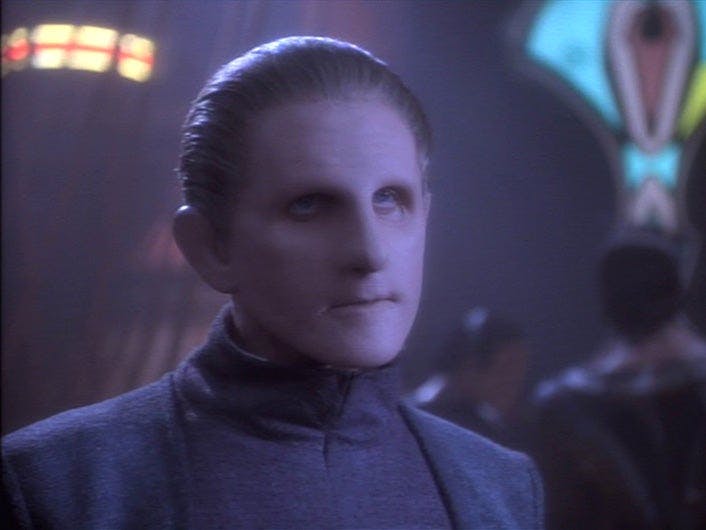
StarTrek.com
"You know, Cardassian rule may have been oppressive but at least it was... simple." - Odo
Odo worked for the Cardassians while they occupied Bajor. That alone would be fairly damning; as Desmond Tutu famously said, “If you are neutral in situations of injustice, you have chosen the side of the oppressor.” Odo enforced order on the Promenade, and by helping to maintain order on the Promenade he was ultimately helping to maintain the stability of Cardassia’s illegal occupation.
Ultimately, Odo was able to earn the respect of the Bajorans and Cardassians alike, mostly by virtue of his Changeling nature: since Odo didn’t eat, drink, have sex, or own possessions, he was largely un-bribe-able and incorruptible as far as that went. He wasn’t prone to racism (everybody is just a “solid” from his perspective, essentially the same race) and didn’t delight in being cruel. These are all good things, to be sure, but they were all good things that Gul Dukat got to claim credit for in his never-ending attempt to make the Bajorans love and respect him.
Furthermore, there are many instances in which Odo abused or misused his power. In Odo’s very first case, Gul Dukat sent him out to solve a murder, of which Kira was the prime suspect. She admitted to Odo that her alibi at the time was that she was committing acts of sabotage against the Resistance, and Odo let her go because she wasn’t guilty of the crime he was investigating. The murder victim was actually a collaborator with the Cardassian regime, and Kira actually was the one who killed him, and if Odo had figured that out at the time he would have turned Kira in without a moment’s thought.
Once the Federation moved in, Odo often expressed frustration at the rigidity of the Federation legal system and the way it afforded suspects and perpetrators due process. This is weird to say — Odo is really lucky that Quark has such a sense of humor, otherwise he’d have the grounds to sue Odo over the constant harassment. Odo went so far as to rent the apartment above Quark’s just to keep an eye on him.
Odo’s shapeshifting abilities have often been used to break the law as well. Taking the form of a rat or dog or inanimate object to obtain evidence or eavesdrop on conversations, which in present-day legal systems would be known as “breaking and entering,” “conducting a search without a warrant,” and “illegal wiretapping.”
In what may be Odo’s worst crime of all, “Things Past” revealed that while working for the Cardassians, Odo allowed innocent Bajorans to be executed for a crime they didn’t commit, because he had grown lax in his investigations and had started to mistake order for justice.
Odo is often so convinced of his own rightness and the guilt of others that he violates their civil liberties, a trick he seems to have learned while collaborating with the Cardassians. In short, Constable Odo is a bastard.
But Wait, There’s More To It
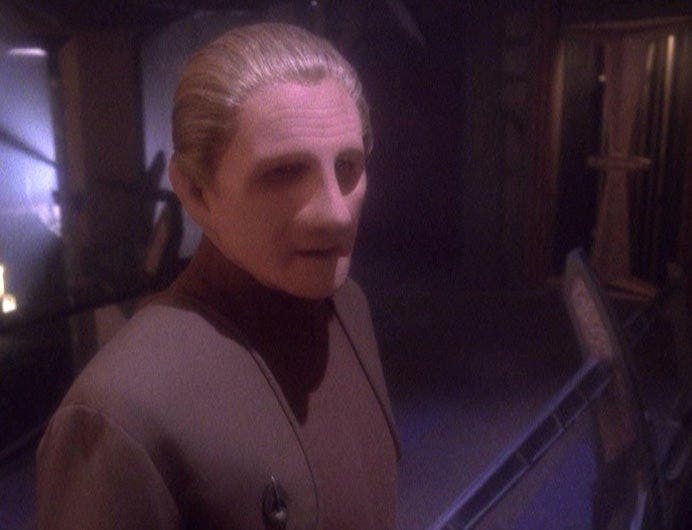
StarTrek.com
"We are talking about the attempt on Gul Dukat's life, not the sociopolitical ramifications of the Resistance!"
"It's all part of the same problem! When your people resort to terrorism and violence… they are fighting against order, against stability, against the rule of law, and this must be stopped."
"There is more to life than the rule of law."
"It has been my observation that only the guilty make that kind of statement." - Odo, Talking To His Past Self
Odo’s journey is more complicated than that, and we’d be doing a disservice to one of the most complicated, nuanced characters in Star Trek if we were to leave it at that.
Because the beautiful philosophy that sits at the heart of the Federation, the belief in Infinite Diversity in Infinite Combinations, comes to some of us more easily than others. Odo comes from a race of people who are used to getting things their own way, a race of people who don’t often have to worry about food or shelter the way the grasping billions throughout the Quadrant do. A race of people who fear and mistrust everyone who isn’t like them, and are willing to perform horrifying acts of violence to bring those people to heel.
Odo’s people imprinted racism and fascism on him at an early age, and that can be a very tough worldview to change — something we’re seeing ample evidence of in the news every day. Like anyone trying to grow as a person, Odo’s journey isn’t a straight line. It’s one full of relapses and backslides and overcorrections, as he tries to do the right thing and doesn’t always know what that is.
Because for Odo, doing what he knows to be morally right will cost him his people, his family, his ability to live a life of belonging and acceptance. And it’s a choice he is forced to make again and again over the run of the show, sometimes coming down on the side of justice, and sometimes caving in to the desire to not be alone any more.
Odo encountered fascism repeatedly in his life, and each time he ran into it he seemed to find it a little more distasteful than the time before. Odo has one last, big backslide that almost gets Rom and Kira killed during the Dominion occupation of DS9, but he snaps out of it in time, and from then on, he never goes back.
Ultimately, Odo sets aside his responsibilities as Chief Constable aboard the station in order to accompany Kira on a journey to free the Alpha Quadrant of fascism. He turns against his own people to save folks he has very little in common with. He saves the Cardassian people from genocide and, by extension, the entire Alpha Quadrant. By the time the credits roll on the final episode Odo is neither a cop nor a bastard any more, and that’s something that discussions of his character often leave out.
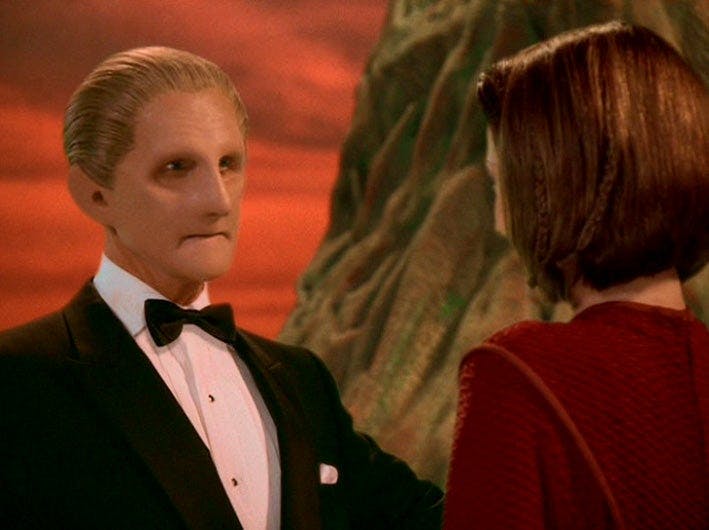
StarTrek.com
Odo may be physically flexible, but he’s mentally and emotionally rigid, and as such it took him a long time to come around to embracing the Trek worldview that we all appreciate. He did get there eventually, though, and that’s a hopeful message for anyone wondering if the people out there making our world a scary place are capable of change.
Sean Kelly (he/him) is a freelance writer based in St. Louis. He occasionally gets depressed that he’ll never know what raktajino tastes like.

